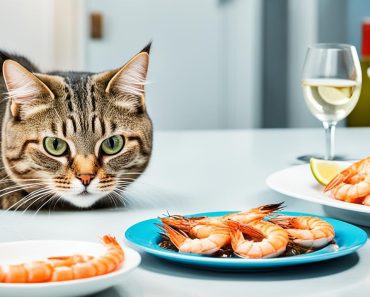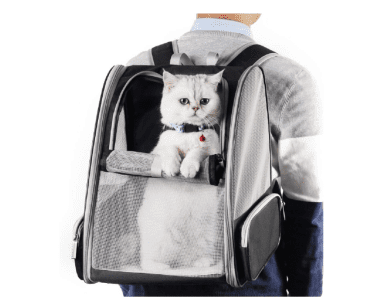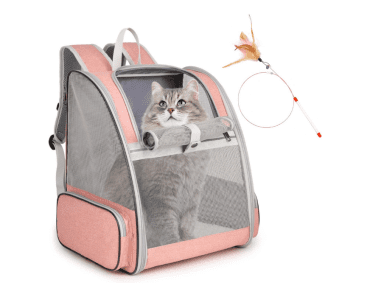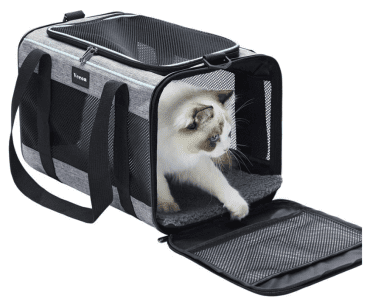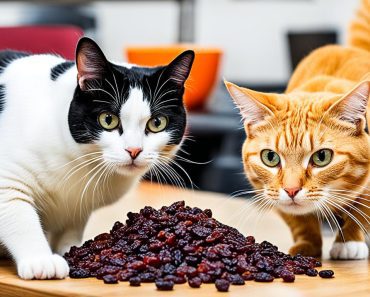Greetings, fellow cat lovers! Today, let’s dive into a question that many of us have pondered: Can cats eat scrambled eggs? As a proud cat parent, I understand the desire to share delicious human food with our feline friends. However, it’s crucial to consider their dietary needs and safety. To shed some light on this topic, I consulted with my trusted veterinarian. So, let’s explore the fascinating world of cats and scrambled eggs together!
Can Cats Eat Scrambled Eggs? Yes, but only as a once in a while treat.
- Cats can safely eat scrambled eggs as an occasional treat, but it should not be their primary source of nutrition.
- When preparing eggs for cats, cook them thoroughly without adding any seasoning, salt, fats, oils, garlic, or onions.
- Eggs are a good source of nutrients for cats, but they should not make up more than 10% of their daily diet.
- Raw eggs should be avoided due to the risk of bacterial infections and interference with biotin absorption.
- Egg yolks are nutritious but high in fat, so they should be given in moderation, especially for overweight or cats with kidney issues.
Are Eggs Safe for Cats?
Eggs can be a safe and nutritious addition to a cat’s diet when given in moderation. They provide a good source of protein and fats, which are essential for a cat’s overall health. However, it is important to remember that eggs should not make up more than 10% of a cat’s daily nutrition.
When feeding your cat eggs, it is crucial to know the appropriate portion size. Overfeeding cats with eggs can lead to an unbalanced diet and potential health issues. It’s always best to consult with your veterinarian to determine the right amount of eggs to include in your cat’s diet.
While eggs provide valuable nutrients, they should not be relied upon as the sole source of nutrition for cats. Cats are obligate carnivores, which means their diet should consist mainly of animal protein. Therefore, it is essential to provide a balanced and complete cat food that meets all of their nutritional needs.
Benefits of Eggs for Cats
- Eggs are a great source of high-quality protein, which helps in muscle development and repair.
- They contain essential amino acids that cats need for overall growth and maintenance of their body tissues.
- Eggs are rich in healthy fats, which provide energy and aid in the absorption of fat-soluble vitamins.
- They also contribute to a healthy skin and coat due to their omega-3 fatty acid content.
While eggs can offer these benefits, it is important to keep in mind that they should be served in appropriate portions and cooked thoroughly. Raw eggs can pose a risk of bacterial contamination, such as Salmonella, which can be harmful to cats.
Overall, eggs can be a beneficial addition to your cat’s diet as long as they are given in moderation and as part of a balanced meal plan. Consult with your veterinarian to ensure you are meeting your cat’s individual nutritional needs.
Raw Eggs and Cats – A Bad Combination
Cats should never be fed raw eggs. While eggs can be a nutritious addition to a cat’s diet when cooked properly, raw eggs pose several risks to feline health.
Raw eggs can contain harmful bacteria like Salmonella and E. coli, which can cause serious infections in cats. These bacterial infections can lead to symptoms such as vomiting, diarrhea, abdominal pain, and dehydration. In some cases, they can even be life-threatening.
Additionally, raw egg whites contain a protein called avidin. Avidin can interfere with the absorption of biotin in cats, which is an important B-vitamin that supports healthy skin, coat, and overall wellbeing. Biotin deficiency can result in skin issues, poor hair quality, and even neurological problems in cats.
To ensure the safety of your furry friend, it is best to cook eggs thoroughly before feeding them to cats. Cooking eggs destroys any harmful bacteria present and makes them safe and digestible for cats. Scrambled eggs or hard-boiled eggs without any seasoning or additives are the best options.
Remember, a balanced and complete diet is crucial for your cat’s health. While eggs can contribute to their nutritional needs, they should never be the main component of their diet. Consult with your veterinarian to determine the appropriate amount of eggs that can be included in your cat’s overall diet.
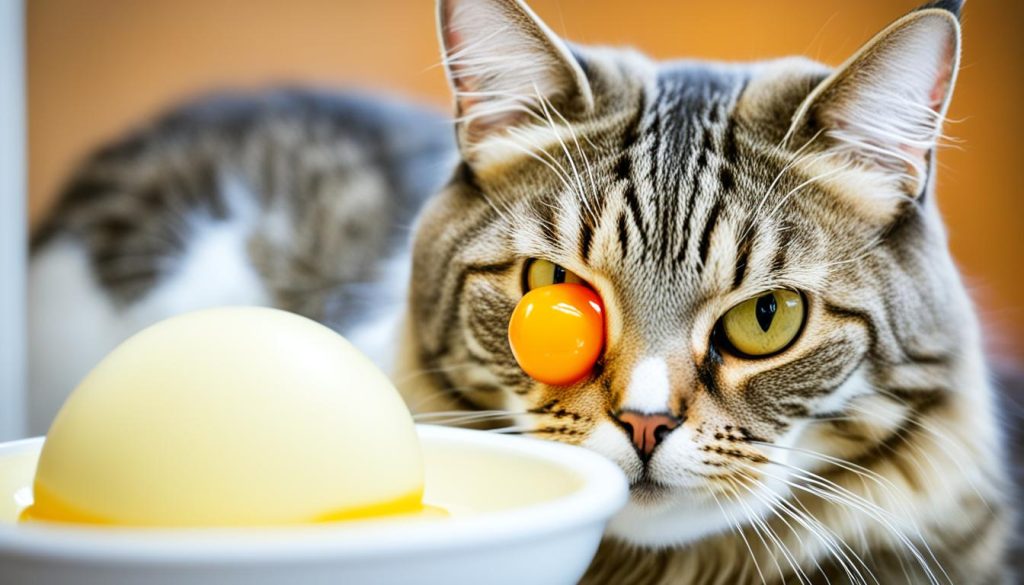
By following these guidelines and making informed choices about your cat’s diet, you can ensure their safety and wellbeing when it comes to consuming eggs.
The Benefits of Egg Yolk for Cats
While egg yolks can be nutritious for cats, it is important to be mindful of their high fat and calorie content. Cats, especially those who are overweight or have kidney issues, should have egg yolks in limited amounts. However, including a small portion of egg yolk in a cat’s diet can provide them with essential nutrients.
Egg yolks are rich in vitamins such as vitamin A, vitamin D, and vitamin E, which are beneficial for a cat’s overall health. These vitamins support their immune system, promote healthy skin and coat, and contribute to proper bone development.
Feeding your cat an occasional small portion of egg yolk can also give them a protein boost. Protein is an essential component of a cat’s diet, contributing to muscle development and repair.
When introducing egg yolk to your cat, it is important to monitor their overall calorie intake and adjust their regular diet accordingly. Remember, moderation is key. Including egg yolk as a treat or an occasional addition to their meals can provide some nutritional benefits without compromising their overall health.
Egg Whites – a Healthy Option for Cats
When it comes to feeding cats, egg whites can be a nutritious and beneficial addition to their diet. Unlike egg yolks, which are high in fat and calories, egg whites offer protein without the added extras. This makes them an excellent choice for cats with weight or health concerns.
Feeding cats egg whites can provide them with a boost of protein, which is essential for their overall health and wellbeing. Protein plays a crucial role in supporting their muscle development, maintaining a healthy coat, and promoting proper immune function.
However, it is important to note that cats should only be given egg whites that are properly prepared and seasoned. Avoid adding any fats, oils, garlic, onions, or other seasonings that may be harmful to feline health.
If you decide to incorporate egg whites into your cat’s diet, it is crucial to remember that they should not be the primary source of nutrition. Cats require a balanced diet that includes a variety of nutrients from different sources.
That said, introducing egg whites as an occasional treat can be a delightful and healthy addition to your cat’s mealtime. Just be sure to monitor their portion sizes and consult with your veterinarian to ensure that you are meeting their dietary needs appropriately.
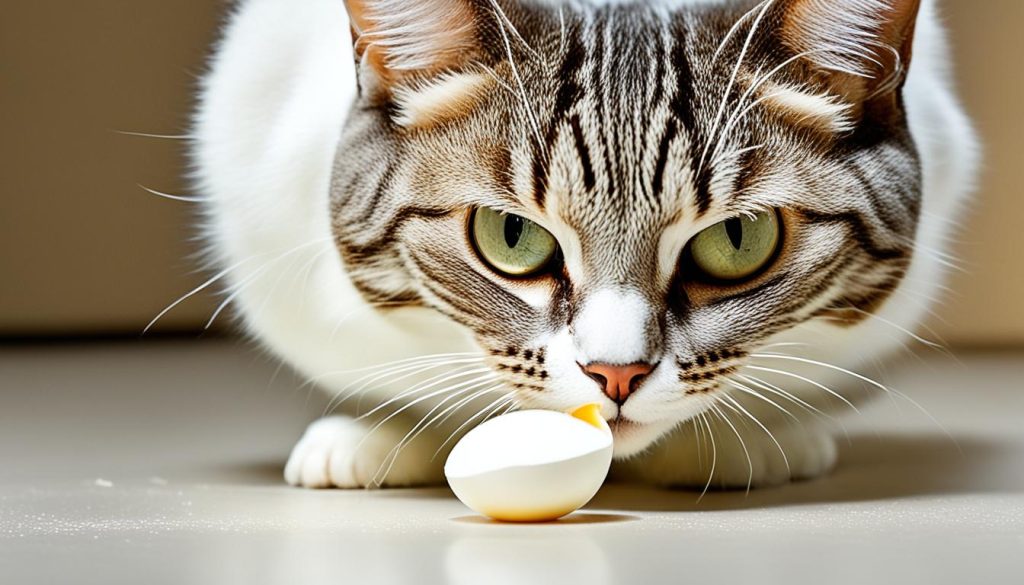
How to Prepare Eggs for Cats
When it comes to serving eggs to your feline companion, proper preparation is key. Cooking eggs thoroughly ensures that they are safe for cats to consume. Here are some guidelines for preparing eggs for your cat:
1. Scrambling or Boiling: Scrambling or boiling eggs without adding any seasoning is a suitable method for preparing eggs for cats. This helps retain the natural flavors and nutrients without introducing any potentially harmful ingredients.
2. Avoid Seasonings: It is important to avoid using fats, oils, salt, garlic, or onions when cooking eggs for cats. These ingredients can be harmful to their health and should be strictly avoided.
3. Portion Control: Monitoring the portion size is crucial when serving eggs to cats. While eggs can be a nutritious treat, they should not make up the majority of a cat’s diet. Remember, moderation is key.
4. Not a Primary Food Source: Eggs should never be the sole source of nutrition for cats. They should be considered an occasional treat and not a substitute for a balanced and complete cat food diet.
By following these guidelines, you can safely introduce eggs to your cat’s diet and provide them with a tasty and nutritious treat. Remember to consult with your veterinarian before making any changes to your cat’s diet.
Conclusion
Cats can safely enjoy scrambled eggs as an occasional treat. When cooked thoroughly without seasoning or added ingredients like salt, fats, oils, garlic, or onions, scrambled eggs can provide cats with a source of nutrients. However, it’s important to remember that scrambled eggs should not be a major part of a cat’s diet but rather a supplemental addition.
Understanding a cat’s eating habits is crucial when introducing new foods like scrambled eggs. While they can savor a piece of scrambled egg, it’s essential to ensure their overall diet remains balanced and meets their specific nutritional needs. Consulting with a veterinarian can offer valuable guidance on a cat’s dietary requirements and any precautions or limitations to consider.
When it comes to scrambled eggs, safety for cats lies in proper cooking and serving. By following appropriate preparation methods, such as thoroughly cooking the eggs and avoiding the use of seasoning or cooking oils, scrambled eggs can provide a safe, nutritious, and enjoyable treat for our feline companions. As with any dietary additions or changes, it’s always best to exercise caution, monitor portion sizes, and prioritize a cat’s well-being.

